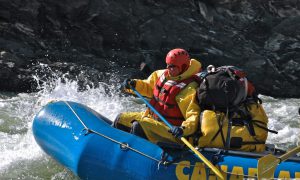
Glen Davis was a Canadian businessman and philanthropist. When he wasn’t managing his financial interests or trekking in remote wilderness, he helped to protect more of Canada than anyone before or after him.
Glen loved big wilderness and was a leading supporter of WWF-Canada’s Endangered Spaces Campaign between 1989-2000, which resulted in the establishment of more than 1,000 new nature reserves, parks and wilderness areas, doubling the amount of protected lands and waters in Canada. Tragically, his life was cut short. Glen was slain in May of 2007 at age 66.
About the Prize
The Canadian Parks and Wilderness Society (CPAWS) was a strong partner in this effort, particularly through our local chapters, which Glen supported right across the country. That’s why the $10,000 Glen Davis Conservation Leadership Prize is a joint project of WWF-Canada and CPAWS. This prize was given for the first time on the 10th anniversary year of Glen’s death to honour his nationally significant contribution to Canada. As such, it is one of the most prestigious recognitions of its kind.
The Glen Davis Leadership Prize is intended to recognize not just improving the decision-making process or making progress towards protection — as necessary as these steps might be. It rewards efforts that lead to the actual protection of land or marine ecosystems in Canada.
Recipients
2021 Winner
About the winner: Lorraine Netro
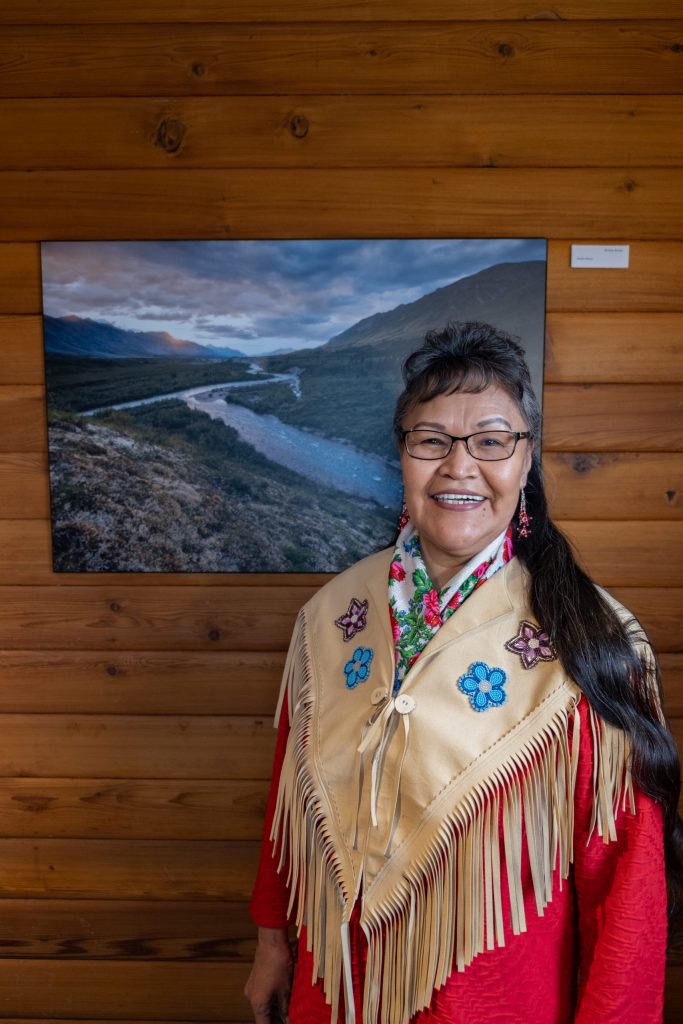
Since 1999, Lorraine Netro has dedicated herself to protecting the Arctic National Wildlife Refuge. The refuge is home to the calving grounds of the Porcupine caribou herd, which migrates between Canada and Alaska every year and holds great significance to the Gwich’in Nation. As part of this work, Netro has long advocated against oil development within the Arctic Refuge.
Netro also served two terms as MLA for the Vuntut Gwich’in, with shadow cabinet roles for the environment, women and justice. She is a board member for both the Gwich’in Steering Committee and Alaska Wilderness League and sits on the Advisory Committee on Climate Action and the Environment for the Assembly of First Nations.
Netro has been instrumental in guiding and mentoring the new generation of Gwitchin leaders, through her selfless advocacy and dedication to the Porcupine caribou. We are pleased to recognize her outstanding conservation efforts with the Glen Davis Conservation Leadership Prize.
About the Prize
The Glen Davis Conservation Prize has been a 5-year joint project between WWF-Canada and The Canadian Parks and Wilderness Society (CPAWS). This prize was first established in 2017, on the 10th anniversary of Davis’s death to honour his nationally significant contributions. 2021 marks the final year that the prize will be awarded.
Lorraine Netro, Old Crow, Yukon, says:
“I am truly humbled and honored by this special recognition to receive the Glen Davis award. Glen Davis’s honorable conservation legacy in Canada and beyond is truly memorable and significant.
Mahsi cho to all who made this happen.
As a Gwitchin, it is our belief that we do not accept honorable recognition for ourselves. I will accept this award on behalf of my family, community, our nation, for all those who came before me and those who will come after me, and those who walk with us to protect our Sacred Lands, the animals and waters. Being stewards of our lands has been taught to us from generation to generation, it is our responsibility to our children, grandchildren and all future generations. More so today with threats to our Sacred places and traditional way of life, the challenges of Climate Change and living in pandemic. Our voice, our work is not done until we have permanent protection for our sacred places.”
Sandra Schwartz, National Executive Director, CPAWS, says:
“CPAWS is thrilled to recognize Lorraine Netro for this year’s Glen Davis Prize. Lorraine is a respected Vuntut Gwitchin elder who has been working tirelessly for more than 20 years to protect the Arctic Refuge and the Porcupine caribou herd. In that time, she has travelled across North America and visited Washington D.C. dozens of times to speak about the importance of the Porcupine caribou herd for the lives of Gwich’in people. Her first speaking tour in the U.S. was part of the Caribou Commons campaign, which Glen Davis helped fund, so it is a fitting tribute to his legacy that Lorraine is this year’s award recipient. She has never been paid for her conservation work but has done it for the good of her community.”
2020 Winner
About the winners: Aleta Karstad and Dr. Fred Schueler
- Fred is a naturalist and longest-serving Research Associate of the Canadian Museum of Nature. His work has focused on monitoring the abundance and distribution of native and invasive species across Canada. Aleta is an award-winning freelance biological illustrator, natural history artist and author. She is a well-known Canadian painter focused on biodiversity and nature.
- In 2009, Fred and Aleta directed the Thirty Years Later Expedition project where they revisited previously observed sites to document the conditions of plants and animals and contribute new valuable data to the Canadian Museum of Nature database.
- Their work has contributed to national protection results such as Cumshewa Head on Haida Gwaii, the rivers crossed by the Energy East Pipeline from Fort McMurray A.B. to Saint John N.B., streams and rivers in northeastern Ontario, and the famed Dumoine River in Quebec. They’ve also helped citizen groups protesting habitat destruction throughout eastern Ontario, discovered or predicted most of the new Species-at-Risk mussel populations in eastern Ontario, and have worked with official bodies on the conservation of the South Nation River, Kemptville Creek, the Limerick Forest, and New Brunswick’s Protected Natural Areas.
- They’ve published popular natural history books and run the NatureList & OREGlist, e-mail list-serves for natural history and road ecology.
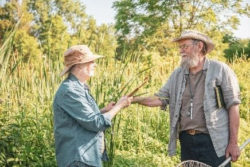
Aleta Karstad and Dr. Fred Schueler, Glen Davis Conservation Leadership Prize winners, say:
“We are honoured to be recognized for our diverse fascinations with everything in nature, especially with plants and animals that aren’t commonly recognized as species. We plan to use this generous prize to make our nature observations, data, and artwork more accessible to science, government, and the public. It will help to make our work a prototype for preserving the field notes that many naturalists have been keeping for generations, and for linking art and science towards conservation action.”
Sandra Schwartz, national executive director of CPAWS, says:
“CPAWS is thrilled to recognize a couple for this year’s Glen Davis Prize. Dr. Fred Schueler and Aleta Karstad are a talented biologist-artist duo well-known in eastern Ontario for their longtime and ongoing work and commitment to protecting nature. For over 40 years, they have visited sites across Canada to document and monitor changes taking place in wildlife and native habitats, and to identify new threats to the environment, both critical to nature protection efforts. They have generously donated their field notes and visual records for the purpose of furthering knowledge, education and science. Their enormous contributions have made a difference for nature protection in Canada.”
Monte Hummel, president emeritus of WWF-Canada, says:
“This year’s Glen Davis winners are two real Canadian conservation heroes. Dr. Schueler — an expert on often-neglected wildlife such as reptiles and amphibians, crayfish, mussels and wetland plants — has been crucial to protecting natural sites from coast to coast to coast. Aleta’s beautiful paintings and biological illustrations have inspired conservation efforts and she has generously donated her work to raise funds for nature protection campaigns. This is truly a dynamic duo who have made a quiet but huge difference for nature in Canada.”
2019 Winner
About winner: Raymond Plourde
- Wilderness Coordinator for the Halifax-based Ecology Action Centre, who along with groups such as CPAWS Nova Scotia and Nova Scotia Nature, has delivered nationally-significant land and water protections in a province where such achievements are particularly challenging. Nova Scotia has a long history of settlement and only 30 per cent of the landscape is publicly owned. Conservation progress requires working collaboratively with governments, private landowners and resource industries.
- Once an advertising executive, Plourde’s conservation roots go back to the 1990s when he volunteered for the Nova Scotia Salmon Association to lead a successful campaign to stop the construction of an open-pit gold mine in the headwaters of the Margaree River.
- Mentored by the late Colin Stewart, who worked for CPAWS Nova Scotia and also served as the province’s Endangered Spaces Coordinator, Plourde played a key role in bringing together forest industry executives and conservationists to develop a plan to protect 12% of Nova Scotia, and to encourage the province to adopt this target.
- Plourde and other dedicated conservationists and groups have since worked to deliver on this goal, increasing the amount of protected land and waters in Nova Scotia by 50 per cent, moving the total from 8 per cent to over 12 per cent of the province as a whole. As a result, important ecological areas throughout the province are now protected, including the upper Margaree River, Fourchu Coast, Medway Lakes and many others.
Ray Plourde, Glen Davis Conservation Leadership Prize winner, says:
“I’m truly humbled by this special recognition. Glen Davis was a real Canadian conservation hero, so to receive an award in his name is a real honour We all know that nature is in serious trouble worldwide and I’m just pleased to have been able to work on saving at least some of it in our little corner of the world, knowing that it contributes to the greater global effort. I’ve also had the privilege of working with hundreds of amazing individuals and groups across Nova Scotia in advancing wilderness conservation here and it is to them I dedicate this award, in particular my conservation mentor, the late Colin Stewart.”
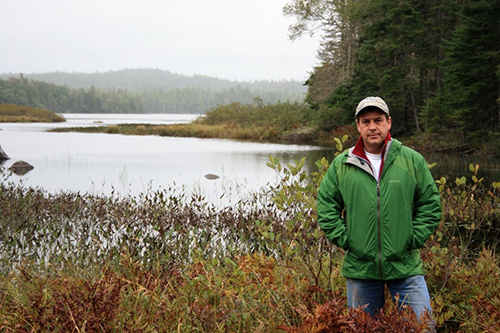
Alison Ronson, interim national executive director of CPAWS, says:
CPAWS is pleased to recognize an individual who has played such an important role in conservation and the creation of protected areas in Nova Scotia. Ray’s work, which is directly inspired by Glen Davis, has left a lasting legacy for both current and future Nova Scotians, and is an example for others who are working for nature in challenging landscapes.
Monte Hummel, president emeritus of WWF-Canada, says:
“Protected areas don’t appear overnight. They often require years, even decades of commitment, advocacy and collaboration. Ray has dedicated decades to this painstaking and often frustrating work, and the result is the protection of essential habitat for wildlife and people in Nova Scotia. Glen Davis understood the challenge and sacrifice involved in creating protected areas. It is fitting that this award go to an individual who, working with partners and under the mentorship of the late Colin Stewart, has played such an important role in moving the yardstick on conservation in Nova Scotia.”
2018 Winner
About winner: Grand Chief Herb Norwegian
- Involved in Dehcho First Nations governance for more than 25 years, holding roles as vice-president of the Dene Nation, chief for Liidlii Kue First Nation and currently grand chief of the Dehcho First Nations.
- Played a critical role in the expansion of the Nahanni National Park Reserve to six times the size of its original boundaries, permanently protecting more than 30,000 square kilometres of Dehcho territories.
- Through community meetings and one-on-one sessions with Dene elders and community members, developed detailed land-use and traditional-knowledge maps that became the blueprint for the draft Dehcho Land Use Plan and resulted in continuous interim protection for 100,000 sq. km of wilderness since 2003.
- Champion of the Dehcho process and Indigenous-led conservation across Canada.
- A patient and dedicated mentor for connecting younger generations to their culture and the land.
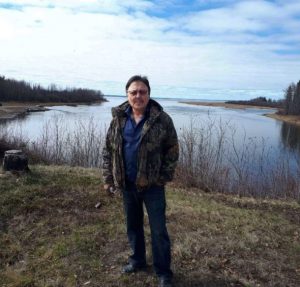
Grand Chief Herb Norwegian, Glen Davis Conservation Leadership Prize winner, says:
“Conserving our land is something that I’ve put my heart into right from day one when I got into public life. And I’m honoured to work for Mother Earth and my people. We hope that within the next year, the Dehcho will make a major contribution to protecting a good part of the Mackenzie Valley through our process. And we hope that it’s a strong signal to the rest of Canada, and to the world, that First Nations have always been the driving force behind land protection.”
Monte Hummel, president emeritus of WWF-Canada, says:
“Everyone talks about bringing together traditional knowledge with western science, but under Grand Chief Herb Norwegian’s leadership the Dehcho have actually done that through their land-use plan, translating lived experience of the land into more than 50,000 digitalized data points. Grand Chief Norwegian is a Canadian visionary for nature and the Dehcho people, enduring delays for nearly 20 years from the Canadian government in his attempts to protect 50 per cent of the Dehcho First Nations territory. He is responsible for deploying conservation action on the ground at the scale of achievement that inspired the life of Glen Davis.”
Éric Hébert-Daly, national executive director, CPAWS, says:
“Having worked closely with Grand Chief Norwegian over the last two decades on expanding and protecting Nahanni National Park Reserve, we’ve seen first-hand how effective he has been in articulating the vision of his nation. We are thrilled to recognize his past and ongoing leadership in conservation on behalf of his people and ultimately for the benefit of Canada and the world through his example.”
2017 Winner
About the inaugural winner: Anne Sherrod
When Anne Sherrod began volunteering for Valhalla Wilderness Society in the early 1980s, she supported herself by washing dishes at a local restaurant. She lived in a tiny cabin while renting out her house because she was unable to pay the mortgage. That was before the hate campaign.
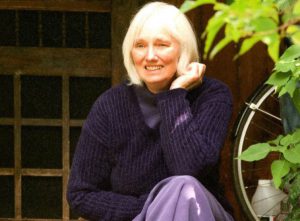
Her first major project with the society was public education in support of a proposed local land-use plan. She and her colleagues persevered during the hate campaign against environmentalists aimed to stop the plan, even when one of her colleagues was beaten up by a mob. Three people were convicted.
“Due to the ferocity of the hate campaign, I was drawn into working for the society day and night,” she says. “The directors and I were driven by the relentless need we saw in the environment.”
“There was no hot water in the cabin,” she says. “I heated water and cooked on a camp stove. That being said, I don’t recall experiencing any sense of deprivation. I was quite happy. I lived in a place I loved.”
That place is in the wilds near New Denver, B.C. After nine years of living in the cabin, she was finally able to move back into her house, thanks to a philanthropist, Glen Davis, and a few others who supported the society.
Sherrod, 70, is the inaugural winner of the $10,000 Glen Davis Conservation Leadership Prize for her decades spent protecting B.C.’s natural riches. The prize, given by WWF-Canada and the Canadian Parks and Wilderness Society, honours Glen Davis’s love and support of the wilderness.
As a director, researcher and writer, Sherrod, together with her colleagues, helped double the amount of protected areas in British Columbia to half a million hectares.
“I drafted and networked the Principle of Parks signed by about 100 Canadian and U.S. environmental groups,” she said. This was in addition to working with several B.C. groups to oppose park privatization during the Park Legacy Project, working to protect the South Moresby National Park Reserve, Goat Range Provincial Park and Valhalla Provincial Park, and today, helping to manage the Selkirk Mountain Caribou Park campaign, of which the gem is the Incomappleux ancient forest.
“We played a major role in the defeat of proposals for private power plants on the Incomappleux River,” she explains.
Much of the success has come from her writing. “I always say I’m 30 per cent activist and 70 per cent writer,” she said. That writer has worked for 35 years now, researching and producing hundreds of action alerts, newsletters, petitions, reports and legal documents.
“Anne toiled, mainly behind the scenes, to get results in an area of the country that Glen loved,” says Monte Hummel, president emeritus of WWFCanada and chair of the group that chose her. “Glen not only supported environmental movements, but people in movements. He bet on people like Anne. He recognized that so many people make a pittance while working hard. Anne is a classic example of someone who deserves this award.”
And she showed that in accepting the prize money, donating $1,000 to efforts by the Valhalla Foundation for Ecology and Social Justice to purchase Bonanza Marsh on the lake where she lives. The marsh is home to wetland birds, vulnerable snail species, rare orchids, Chinook salmon and trout that congregate before their journey up the creek.
